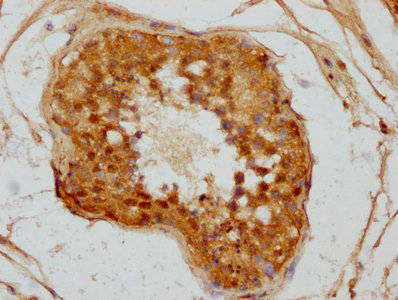Full Product Name
Rabbit anti-Homo sapiens (Human) CTNNA3 Polyclonal antibody
Alternative Names
4930429L08Rik antibody; 4933408A16 antibody; Alpha catenin like protein antibody; Alpha T catenin antibody; Alpha T-catenin antibody; Cadherin associated protein antibody; Cadherin-associated protein antibody; Catenin alpha 3 antibody; Catenin alpha-3 antibody; Catna3 antibody; CTNA3_HUMAN antibody; CTNNA3 antibody; MGC26194 antibody; MGC75041 antibody; OTTHUMP00000019684 antibody; OTTMUSP00000028119 antibody; OTTMUSP00000028120 antibody; RP11-433J16.1 antibody; VR22 antibody
Immunogen
Recombinant Human Catenin alpha-3 protein (163-302AA)
Immunogen Species
Homo sapiens (Human)
Conjugate
Non-conjugated
The CTNNA3 Antibody (Product code: CSB-PA883421LA01HU) is Non-conjugated. For CTNNA3 Antibody with conjugates, please check the following table.
Available Conjugates
| Conjugate |
Product Code |
Product Name |
Application |
| HRP |
CSB-PA883421LB01HU |
CTNNA3 Antibody, HRP conjugated |
ELISA |
| FITC |
CSB-PA883421LC01HU |
CTNNA3 Antibody, FITC conjugated |
|
| Biotin |
CSB-PA883421LD01HU |
CTNNA3 Antibody, Biotin conjugated |
ELISA |
Purification Method
>95%, Protein G purified
Concentration
It differs from different batches. Please contact us to confirm it.
Buffer
Preservative: 0.03% Proclin 300
Constituents: 50% Glycerol, 0.01M PBS, pH 7.4
Tested Applications
ELISA, IHC
Recommended Dilution
| Application |
Recommended Dilution |
| IHC |
1:200-1:500 |
Storage
Upon receipt, store at -20°C or -80°C. Avoid repeated freeze.
Lead Time
Basically, we can dispatch the products out in 1-3 working days after receiving your orders. Delivery time maybe differs from different purchasing way or location, please kindly consult your local distributors for specific delivery time.
Usage
For Research Use Only. Not for use in diagnostic or therapeutic procedures.







